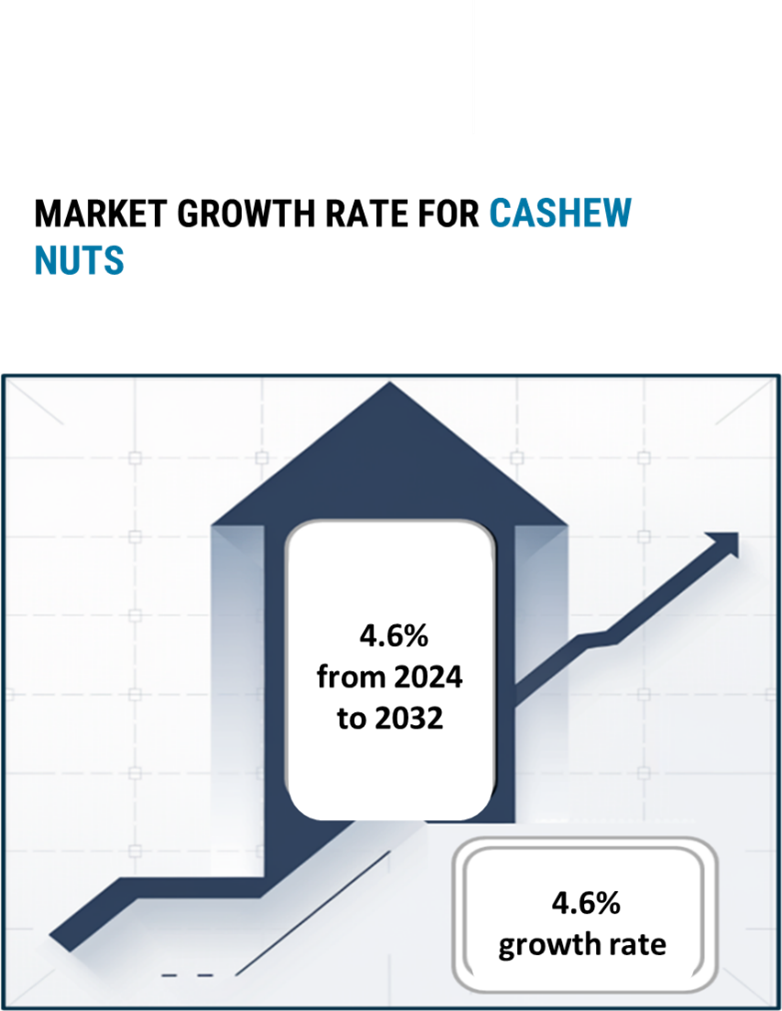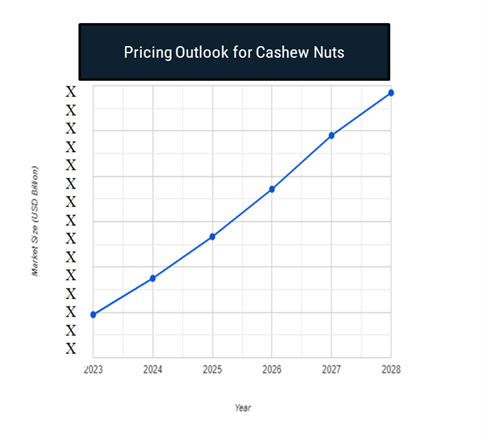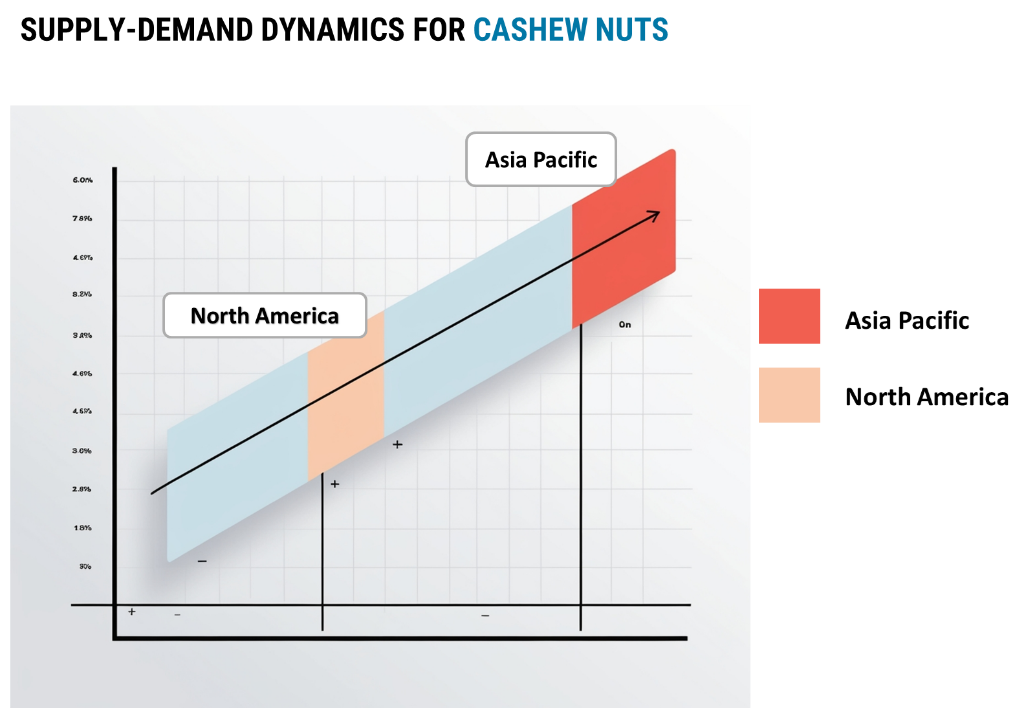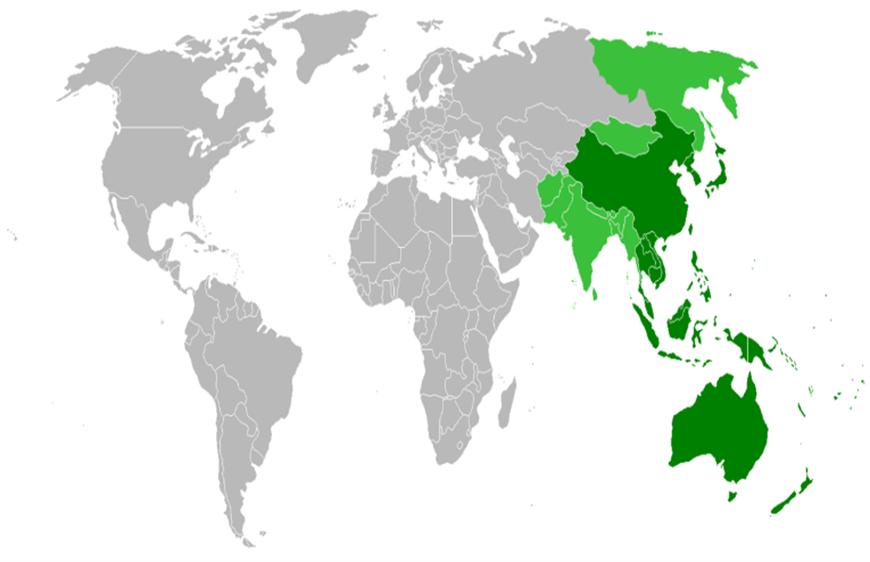Summary Overview
Cashew Nuts Market Overview:
The global cashew nuts market is witnessing consistent growth, driven by increasing demand across industries such as food processing, confectionery, cosmetics, and health supplements. This market includes various forms of cashews, including whole nuts, processed kernels, and cashew by-products. A comprehensive analysis of procurement trends highlights cost optimization strategies and the integration of digital tools to improve sourcing and processing efficiencies.
Key future challenges in procurement include managing fluctuating raw cashew prices, ensuring a stable supply chain amidst changing climatic conditions, and meeting rising consumer demands for sustainable and ethically sourced products. Digital procurement solutions and strategic sourcing play a critical role in optimizing the supply chain for cashews while enhancing competitiveness. With global demand projected to grow, companies are increasingly leveraging market intelligence to enhance efficiency and mitigate risks.
The cashew nuts market is expected to maintain steady growth through 2032, with the following key highlights:
-
Market Size: The global cashew nuts market is projected to reach USD 11.67 billion by 2032, growing at a CAGR of approximately 4.6% from 2024 to 2032.
Growth Rate: 4.6%

-
Sector Contributions: Growth in the market is driven by: - Food and Beverage Sector Growth: Rising demand for healthy snacks, plant-based products, and nut-based dairy alternatives.
- Health and Wellness Trends: Increasing awareness of the nutritional benefits of cashew nuts, driving demand for premium-quality, organic, and non-GMO varieties.
-
Technological Advancements: Advancements in processing techniques, such as automated shelling and grading systems, are improving efficiency and reducing waste. -
Innovations: Investments in cold storage and supply chain technologies are ensuring the quality and freshness of cashews throughout the distribution network. -
Regional Insights: Asia-Pacific remains a significant contributor to the market, driven by large-scale production in countries like India and Vietnam, while North America and Europe are key consumers due to rising health consciousness and preference for nutritious snacks.
Key Trends and Sustainability Outlook:
-
Digital Integration: Automation in grading, processing, and packaging is optimizing production workflows and reducing operational costs. -
Advanced Processing Materials: Use of eco-friendly packaging materials and sustainable processing technologies. -
Focus on Ethical Sourcing: Increasing emphasis on traceable supply chains and fair trade practices to ensure sustainability. -
Customization Trends: Growing demand for cashews tailored to specific uses, such as roasted, flavoured, or raw kernels. -
Data-Driven Supply Chain: Leveraging analytics for real-time inventory management and demand forecasting.
Growth Drivers:
-
Rising Health Awareness: The increasing popularity of nutrient-dense and low-fat snack options is boosting demand. -
Plant-Based Food Trends: The use of cashew nuts in vegan products like milk, cheese, and desserts is driving growth. -
Global Trade Expansion: Growing international trade opportunities for cashew exporters, particularly in emerging markets. -
Sustainability Focus: Companies investing in eco-friendly and fair-trade-certified cashew nuts to meet consumer preferences. -
Customization Needs: Demand for tailored offerings, such as flavored or processed nuts, catering to evolving culinary and snacking trends.
Overview of Market Intelligence Services for the Cashew Nuts Market:
Recent analyses highlight challenges like price volatility of raw cashews, seasonal production cycles, and increasing quality requirements. Market intelligence provides actionable insights into procurement opportunities, helping companies identify cost-saving measures, streamline vendor relationships, and build resilient supply chains. These insights also aid organizations in meeting sustainability goals, maintaining compliance, and managing costs effectively.
Procurement Intelligence for Cashew Nuts: Category Management and Strategic Sourcing:
To stay competitive in the cashew nuts market, businesses are enhancing procurement processes through spend analysis, enabling efficient vendor management and improved supply chain performance. Effective category management and strategic sourcing are essential for reducing procurement costs and ensuring a consistent supply of high-quality cashews. By utilizing actionable market intelligence, companies can refine their procurement strategies, optimize supplier terms, and achieve sustainable growth.

Pricing Outlook for Cashew Nuts: Spend Analysis
The pricing outlook for cashew nuts is expected to remain moderately stable, though potential price increases may arise due to key factors. Fluctuating raw cashew nut costs, influenced by climatic conditions and global supply-demand imbalances, play a significant role in shaping price trends. Additionally, the growing demand for premium-quality, organic, and value-added cashew products is driving upward pressure on prices.

Graph shows general upward trend pricing for cashew nuts and growing demand. However, there may be fluctuations influenced by economic conditions, technological advancements, and competitive dynamic.
Efforts to improve processing efficiency, minimize waste, and adopt advanced technologies such as automated shelling and sorting systems are essential for managing costs. The development of sustainable packaging solutions and innovative processing techniques can further help mitigate price increases.
Collaboration with ethically sourced suppliers, prioritizing fair trade practices, and enhancing supply chain logistics are critical strategies for cost management. Despite these challenges, maintaining a focus on quality control, compliance with regulatory standards, and investment in research and development will be vital for managing pricing effectively.
Cost Breakdown for Cashew Nuts Total Cost of Ownership (TCO) and Cost-Saving Opportunities
- Raw Materials (40%)
- Description: Raw materials include unshelled cashew nuts, additives for flavoring or preservation, and packaging materials. These must adhere to quality standards to ensure customer satisfaction and product safety.
- Trends: Rising demand for organic and sustainably sourced raw cashews is influencing procurement practices. Suppliers are increasingly adopting innovative farming methods to enhance yield and meet eco-friendly standards.
- Labor (XX%)
- Packaging Services (XX%)
- Infrastructure & Overheads (XX%)
Cost-Saving Opportunities: Negotiation Lever and Purchasing Negotiation Strategies
In the cashew nut industry, enhancing procurement methods and streamlining processing techniques can result in considerable cost reductions and operational improvements. Building long-term relationships with raw cashew nut suppliers, particularly in key production regions, can enable bulk purchase discounts, thereby lowering per-unit costs. Strategic partnerships with processing facilities can provide cost benefits through improved payment terms and bulk processing efficiencies. Investing in modern processing technologies, such as automated shelling and grading machines, can significantly cut labor costs, increase precision in nut processing, and reduce wastage. Emphasizing energy-efficient production methods and sourcing sustainably grown cashew nuts can further lower operating costs while meeting the preferences of environmentally conscious consumers. Additionally, implementing multi-sourcing strategies can minimize risks associated with supply chain disruptions and strengthen negotiating power with suppliers.

Supply and Demand Overview for Cashew Nuts: Demand-Supply Dynamics and Buyer Intelligence for Effective Supplier Relationship Management (SRM)
The cashew nut market is witnessing robust growth, driven by rising demand across various industries, such as food processing, snacks, and confectionery. The balance of supply and demand is influenced by factors such as evolving customer preferences, production innovations, and global trade dynamics.
Demand Factors
-
Rising Consumption of Healthy Snacks: Increased consumer awareness about health and wellness is boosting the demand for nutrient-rich snacks like cashew nuts. -
Food Processing Industry Growth: The expanding use of cashew nuts in confectioneries, baked goods, and dairy substitutes drives the need for premium-quality cashew kernels. -
Export Market Demand: Growing international demand for processed cashews, particularly in regions like Europe and North America, supports market expansion. -
Premium and Organic Products: Rising preferences for organic, fair-trade, and value-added cashew products are shaping market trends.
Supply Factors
-
Climate-Dependent Production: Cashew nut cultivation is heavily influenced by weather conditions, impacting global supply consistency. -
Technological Advancements: Innovations in processing, such as mechanized shelling and automated roasting, enhance supply efficiency and product quality. -
Availability of Skilled Labor: A skilled workforce in harvesting, processing, and quality control plays a vital role in maintaining supply chain reliability. -
Supplier Competition: Intense competition among cashew exporters and processors ensures better quality and competitive pricing for buyers.
Regional Demand-Supply Outlook: Cashew Nuts
The Image shows growing deman d for cashew nuts in both Asia Pacific and North America, with potential price increases and increased Competition.
d for cashew nuts in both Asia Pacific and North America, with potential price increases and increased Competition.
Asia-Pacific: Dominance in Cashew Nuts
The Asia-Pacific region, particularly countries like India, Vietnam, and Indonesia, holds a dominant position in the global cashew nut market, driven by several critical factors:
-
Leading Cashew Production Hubs: Asia-Pacific is home to some of the world’s largest cashew-producing nations, supported by favourable climatic conditions and vast agricultural lands. This ensures a steady supply of raw cashew nuts for both domestic consumption and export markets. -
Strong Processing Capabilities: The region benefits from advanced processing facilities equipped with modern technologies for shelling, peeling, and grading, enabling the production of high-quality cashew kernels tailored to diverse market demands. -
Cost-Effective Labor and Production: The availability of affordable labor and lower operational costs in key producing countries gives Asia-Pacific a competitive edge in delivering cost-efficient cashew products globally. -
Export Leadership and Global Reach: Asia-Pacific countries, particularly Vietnam and India, are leading exporters of cashew nuts, supplying premium-quality kernels to regions such as North America, Europe, and the Middle East. -
Focus on Quality and Sustainability: Producers in the region are increasingly adopting sustainable farming practices and advanced quality control measures to meet international standards and cater to the rising demand for organic and ethically sourced cashew nuts.

Asia Pacific Remains a key hub cashew nuts price drivers Innovation and Growth.
Supplier Landscape: Supplier Negotiations and Strategies
The supplier landscape in the cashew nut market is dynamic, with a mix of global and regional suppliers driving the growth of the industry. These suppliers play a crucial role in influencing various market aspects, including pricing, product quality, and supply chain efficiency. The market is highly competitive, with large suppliers dominating global trade while smaller, specialized firms focus on niche markets, such as organic and high-quality cashew nuts.
The supplier landscape particularly in countries is highly active, with both established players and emerging suppliers catering to global and local demand. As key cashew-producing countries, suppliers are increasingly focusing on innovation, sustainability, and strategic partnerships to enhance market share and meet the growing demand for high-quality, ethically sourced cashew nuts.
Key suppliers in cashew nut market include:
- Olam International
- Kumudini Cashew Industries
- Vina Cashew
- Tandem Enterprises
- Sree Siva Cashew Company
- Rural Enterprises (India)
- Vietnam Cashew Association
- Indo-Asian Cashews
- Rajasthan Cashew Corporation
- Bali Cashews

Key Developments Procurement Category Significant Development:
Significant Development |
Description |
Market Growth |
The global cashew nut market is experiencing growth, driven by increasing demand from food industries, snacking, and health-conscious consumers. |
Sustainable Practices |
Focus on environmentally friendly farming practices and sustainable sourcing of cashew nuts to support ecological goals and meet consumer preferences for ethical products. |
Product Diversification |
Expansion in the range of cashew products, including organic cashews, flavored cashews, and cashew-based snacks, catering to diverse market needs. |
Technological Innovations |
Adoption of advanced processing technologies, such as automated shelling and grading systems, improves product quality and reduces waste in production. |
E-commerce Expansion |
Growth in online sales platforms enables wider accessibility to cashew products globally, catering to both consumer and bulk markets. |
Focus on Miniaturization |
Increasing demand for smaller packaging sizes, such as single-serving packs, to meet the needs of on-the-go consumers and health-conscious buyers. |
Regional Manufacturing Hubs |
Establishment of manufacturing facilities in major cashew-producing countries like India and Vietnam boosts production efficiency and strengthens the supply chain. |
Cashew Nuts Attribute/Metric |
Details |
Market Sizing |
The global cashew nuts market is projected to reach USD 11.67 billion by 2032, growing at a CAGR of approximately 4.6% from 2024 to 2032. |
Cashew Nut Technology Adoption Rate |
Approximately 35% of cashew nut processors are adopting advanced technologies such as automated shelling systems and digital traceability for quality control and sustainability. |
Top Cashew Nut Strategies for 2024 |
Focus on expanding organic and value-added cashew product offerings, improving processing efficiency, and adhering to ethical sourcing and sustainability practices. |
Cashew Nut Process Automation |
25% of companies in the cashew industry have automated production processes such as shelling, grading, and packaging to enhance efficiency and ensure consistent quality. |
Cashew Nut Process Challenges |
Major challenges include fluctuating raw material prices, managing supply chain disruptions, and ensuring sustainable farming practices to meet increasing demand for ethical sourcing. |
Key Suppliers |
Leading suppliers include Olam International, Kumudini Cashew Industries, and Vina Cashew, offering a wide range of cashew products catering to various markets. |
Key Regions Covered |
Asia-Pacific, particularly India, Vietnam, and Indonesia, dominates cashew production, with significant demand in North America and Europe due to the growing health-conscious consumer base. |
Market Drivers and Trends |
Growth driven by rising health-consciousness, demand for organic snacks, and the increasing popularity of cashew-based products in the food and beverage industry. |










